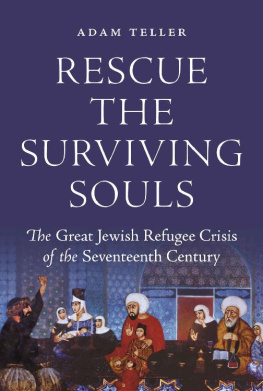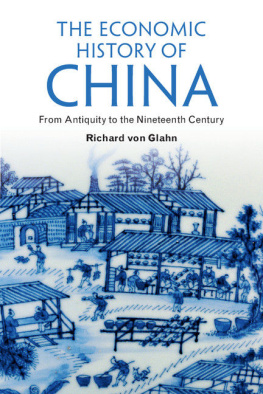Stanford University Press
Stanford, California
2016 by the Board of Trustees of the Leland Stanford Junior University.
All rights reserved.
An earlier version of this work was published in Hebrew under the title Kesef, koa, ve-haspaah: Ha-yehudim be-auzot bet Radzivil be-Lita ba-meah ha-shemonah-esreh
[Money, Power, and Influence: The Jews on the Radziwi Estates in Lithuania in the Eighteenth Century]. 2005, Merkaz Zalman Shazar le-Toledot Yisrael, Jerusalem.
No part of this book may be reproduced or transmitted in any form or by any means, electronic or mechanical, including photocopying and recording, or in any information storage or retrieval system without the prior written permission of Stanford University Press.
Printed in the United States of America on acid-free, archival-quality paper
Library of Congress Cataloging-in-Publication Data
Names: Teller, A., author.
Title: Money, power, and influence in eighteenth-century Lithuania : the Jews on the Radziwi estates / Adam Teller.
Other titles: Kesef, koa, ve-hashpaah. English
Description: Stanford, California : Stanford University Press, 2016. | An earlier version of this work was published in Hebrew under the title Kesef, koa, ve-hashpaah. | Includes bibliographical references and index. | Description based on print version record and CIP data provided by publisher; resource not viewed.
Identifiers: LCCN 2016021293 (print) | LCCN 2016020113 (ebook) | ISBN 9780804798440 (cloth : alk. paper) | ISBN 9780804799874 (ebook) |
Subjects: LCSH: Radziwill family. | JewsLithuaniaHistory18th century. | JewsLithuaniaEconomic conditions18th century. | LatifundioLithuaniaHistory18th century. | LithuaniaEthnic relationsHistory18th century. | Lithuania (Grand Duchy)History18th century.
Classification: LCC DS135.L5 (print) | LCC DS135.L5 T4513 2016 (ebook) | DDC 305.892/404793dc23
LC record available at https://lccn.loc.gov/2016021293
Cover illustration: Jean-Pierre Norblin, Chartier Juif, 1817. Wikimedia Commons
Cover design: Rob Ehle
Typeset by Bruce Lundquist in 11/14 Adobe Garamond Pro
Preface
In the decade that has passed since my study of the Jews on the Radziwi estates was published in Hebrew in Jerusalem in 2005, a great deal has changed in the field of Jewish history, particularly in the English-speaking worldso much, in fact, that I became convinced that a revised English-language version of my book, updated to take the new trends into account, would have something fresh to contribute.
The most significant of the changes is the reintroduction of economic history into the mainstream of Jewish historical research. This is in no small measure a reaction to the dominance in recent decades of the cultural turn, which has focused attention on representation (in particular, self-representation) and identity in the Jewish historical experience. While in no way negating the value of this approach, a group of scholars has come to feel that a grounding in the concrete realities of Jewish life is also of great importance for historical analysis. From there to the study of the economic activity that was a constitutive factor of Jewish society in every time and place has been but a small step.
I have witnessed this development with a great deal of satisfaction since this is the approach adopted by my own study. In it, I try to assess how the economic roles Jews played on noble-owned estates in the eighteenth-century Polish-Lithuanian Commonwealth led to their deep penetration of both the estate economy and the society around them. I go on to show how this development had a transformative effect on Eastern European Jews, reconstituting them as a group wielding significant economic power that could be leveraged into a much stronger position in society. Finally, I argue that, beyond shaping the internal relations of Jewish society, the phenomena discussed in the book had far-reaching implications for the history of Poland-Lithuania as a whole.
At the time I wrote the original study I felt somewhat isolated academically, rather like a voice in the wilderness. Very few scholars appreciated my claims that economic activity was a transformative force that empowered rather than marginalized Jews, that it was a crucial element in the growth of their communities rather than just a cause of hatred and violence, and that the development of the societies surrounding them cannot be understood without taking it into account. Today that is no longer the case. New publications in the field of Jewish economic history appear every year. Conferences, research groups, and academic discussions are now more common, and scholarly dialog flourishes. I have been privileged to take part in some of this activity.
Though the immediate audience for this work is the scholarly community of Jewish historians (by which I mean historians of the Jewish past), I trust that the book will have a great deal to say to other groups, too. Since the original Hebrew study was inaccessible to this broader audience, the publication of a revised version in English seemed to me all the more important. Knowing that the book, in its updated form, is open not just to Jewish historians but to economic historians and scholars of Polish history, too, gives me a great deal of satisfaction.
Economic historians will find here a new analysis of the late feudal economy in Poland-Lithuania that emphasizes not questions of production, as so many have done before, but the role of the markets in the agricultural economy. The focus on Jews is crucial for this analysis, because they not only dominated these markets but also helped shape them.
Important on its own terms, this analysis also has something to contribute to the extensive discussions on the rise of capitalism. It can do so by providing valuable comparative perspectives drawn, paradoxically enough, from an examination of a road not taken. The late feudal economy proved not to be viable in a Europe undergoing the beginnings of capitalist development. The story of the Polish-Lithuanian economy and its Jews, for all their efflorescence during the eighteenth century, is ultimately one of failure and as such is highly instructive.
Another audience for this study is the historians of Poland. Since the fall of communismand even a little before thatPolish historiography has begun to acknowledge that Jews formed a part of Polish society from at least the High Middle Ages. Much of the scholarship treats them as a separate, largely self-contained element within Polish society and focuses on the relations that developed between the Christian majority and the Jews who lived in their midst. It has proved a highly fruitful perspective, enriching both Polish and Jewish historiography.
I here propose a different approach. Rather than viewing Jews as a distinct group that lived on its own terms and maintained a set of relations with the society around it, this study treats them as an integral part of eighteenth-century Poland-Lithuania. Thus, it shows that the Jews were defined not so much by their religious or cultural distinctiveness as by the ways in which they participated in economy and society. The Jews emerge from the analysis transformed from objects of Polish-Jewish relations into subjects of Polish history itself.
Such a point of departure raises the intriguing question of how the presence, activity, and socioeconomic relations of Jews in Poland-Lithuania influenced the society around them. As will become clear from this study, the Jews were by no means an isolated and marginal group in the Commonwealth. The roles they played in the economy were of fundamental importance in shaping not only the magnate families they served but the very development of the state.




